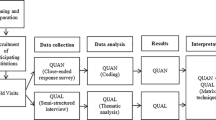Abstract
Background
Integrative medicine (IM), a combination of conventional and complementary and alternative medicine (CAM), has become a popular source of medical care, yet little is known about its use.
Objective
To identify the motivations of people who choose IM for their primary care needs.
Design
Qualitative study from focus group data of regular users of IM.
Participants
Six focus groups that include a total of 37 regular users of IM who consented to participate in a study of IM use.
Approach
Focus group meetings were audiotaped and transcribed verbatim. Qualitative analysis using grounded theory was used to derive the motivations for use of IM.
Results
Participants beliefs include the following: the combination of CAM and conventional medicine is better than either alone; health is a combination of physical, emotional, and spiritual well being; nutrition and lifestyle play a role in wellness; and pharmaceuticals should be avoided except as a last resort. Participants suffer from health problems that are not well treated by conventional medicine. Participants want to discuss CAM with physicians and obtain guidance on its use. Participants want time with their providers, to feel listened to and to have the opportunity for shared decision-making.
Conclusion
Much of what patients are seeking in integrative medical care is likely universally shared: a strong therapeutic relationship with providers who listen and provide time and knowledgeable advice. Users believe a combined approach of CAM and conventional medicine is better than either alone and want to be able to discuss CAM use with their providers.
Similar content being viewed by others
References
Eisenberg DM, Davis RB, Ettner SL. Trends in alternative medicine use in the United States, 1990–97. JAMA. 1998;280:1569–75.
Tindle HA, Davis RB, Phillips RS, Eisenberg DM. Trends in use of complementary and alternative medicine by US adults: 1997–2002. Altern Ther Health Med. 2005;11:42–9.
Barnes PM, Powell-Griner E, McFann K, Nahin RL. Complementary and alternative medicine use among adults: United States, 2002. Adv Data. 2004;343:3–19.
Astin JA. Why patients use alternative medicine: results of a national survey. JAMA. 1998;279:1548–53.
National Center for Complementary and Alternative Medicine. Information on complementary and alternative medicine. http://nccam.nih.gov/health/whatiscam/. Accessed July 2, 2007.
Snyderman R, Weil AT. IM bringing medicine back to its roots. Arch Intern Med. 2002;162:395–7.
Maizes V. Revisiting the health history. An integrative medicine approach. Int J Integr Med. 2002;4(3).
Institute of Medicine of the National Academies. Complementary and Alternative Medicine in the United States. Institute of Medicine of the National Academies Summary Report. Washington, DC: National Academies Press; 2005.
Glaser BW, Strauss A. The Discovery of Grounded Theory. Chicago: Aldine; 1968.
Wilson JL. Adrenal Fatigue, the 21st Century Stress Syndrome. Petaluma: Smart Publications; 2001.
Crook WG. The Yeast Connection: A Medical Breakthrough. Jacson: Professional Books; 1986.
Eisenberg DM, Kessler RC, Van Rompay MI. Perceptions about complementary therapies relative to conventional therapies among adults who use both: results from a national survey. Ann Intern Med. 2001;135:344–51.
Verhoef MJ, Scott CM, Hilsden RJ. A multimethod research study on the use of complementary therapies among patients with inflammatory bowel disease. Altern Ther Health Med. 1998;4:68–71.
Laine C, Davidoff F, Lewis CE, et al. Important elements of outpatient care: a comparison of patients’ and physicians’ opinions. Ann Intern Med. 1996;125:640–5.
Gerteis M, Edgman-Levitan S, Daley J, et al. Through the Patient’s Eyes: Understanding and Promoting Patient-Centered Care. San Francisco: Jossey-Bass Publisher; 1993.
Richardson MA, Sanders T, Palmer JL, Greisinger A, Singletary SE. Complementary/alternative medicine use in a comprehensive cancer center and the implications for oncology. J Clin Oncol. 2000;18:2505–14.
Siahpush M. Postmodern values, dissatisfaction with conventional medicine and popularity of alternative therapies. J Sociol. 1998;34:58–70.
Coulter ID, Willis EM. The rise and rise of complementary and alternative medicine: a sociological perspective. Med J Aust. 2004;180:587–9.
Hesse BW, Nelson DE, Kreps GL. Trust and sources of health information. Arch Intern Med. 2005;16:2618–24.
Acknowledgement
We thank Russ Phillips, MD, from the Division for Research and Education in Complementary and Integrative Therapies, Osher Institute, Harvard Medical School, and the Division of General Medicine and Primary care, Department of Medicine, Beth Israel Deaconess Medical Center, Boston, MA, for his assistance with the conceptual development of this project. This project was supported by the Center for Integrative Health, Medicine and Research, 2032A Broadway, Santa Monica, CA, 90404, and Dr. McCaffrey was supported during the initial planning phase by an Institutional National Research Service Award for Training in Alternative Medicine Research (T32 AT00051), National Institutes of Health, Bethesda, MD.
Conflict of Interest
None disclosed.
Author information
Authors and Affiliations
Corresponding author
Rights and permissions
About this article
Cite this article
McCaffrey, A.M., Pugh, G.F. & O’Connor, B.B. Understanding Patient Preference for Integrative Medical Care: Results from Patient Focus Groups. J GEN INTERN MED 22, 1500–1505 (2007). https://doi.org/10.1007/s11606-007-0302-5
Received:
Revised:
Accepted:
Published:
Issue Date:
DOI: https://doi.org/10.1007/s11606-007-0302-5



